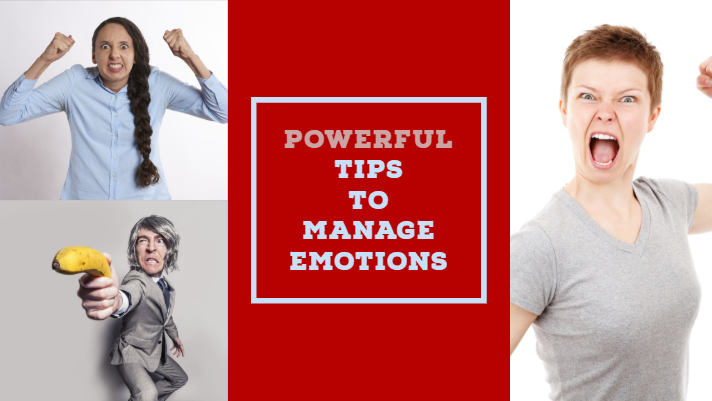Managing emotions is an essential skill that can greatly impact one’s personal and professional life. Here are some powerful tips to help individuals effectively manage their emotions. Firstly, self-awareness is key. Taking the time to recognize and understand our emotions allows us to better control and respond to them. Secondly, practicing mindfulness can be extremely beneficial. By staying present in the moment and focusing on our thoughts and feelings, we can prevent ourselves from becoming overwhelmed by negative emotions. Additionally, finding healthy outlets for emotions, such as exercise or talking to a trusted friend or therapist, can provide a release and prevent them from building up. Finally, developing strong communication skills is crucial. Expressing our emotions in a respectful and constructive manner allows us to effectively communicate our needs and resolve conflicts. By implementing these tips, individuals can successfully manage their emotions and lead a more balanced and fulfilling life.
-
Mood Boosters
- Read a book
- Watch a funny video (Youtube and facebook are full of them)
- Play with your pet
- Watch a movie you loved when you were younger (If you can find them on DVD, I guess with the VHS tapes, you might need to have a VHS player)
- Clean up your room (Moderate I will say, if you over do this mood booster, you might end up cleaning your house compulsively)
- Make a list of places you want to travel and see (It is great to dream and make a list. In Saying that, there are 195 countries in the world today. you might end up with a massive list)
-
Address Your Basic Needs
- Eat healthy food
- Drink lots of water
- Take a warm shower or bath
- Sleep well and take a nap
-
Feelings
- Draw how you’re feeling (I am assuming you are arty, if not write your feelings down)
- Make a gratitude list
- Let yourself cry
- Rip paper into small pieces (This one is therapeutic, just don’t like cleaning up after)
- Write yourself a letter and vent. You can vent by writing a letter to the person who upset you. Keep the letter a couple of days and then tear it up. (Stick to pen and paper—stay away from social media. You may say something you might regret, or create a social media stir up)
-
Problem Solving
- Try some puzzles or sudoku (I would say try 3000 pieces, by the time you have finished with the puzzle, you might actually solve your problem, and discover your strengths)
- Make a list of your strengths. There are plenty of things about you that are awesome, no matter how down you are feeling at the moment.
- If a person has upset you, talk with them directly. (If you are comfortable. And also try to remember to be calm and collective.)
-
Act of Kindness
- Do something kind for someone you know.
- Volunteer your time.
-
Stress Relievers
- Learn something new – try a new hobby
- Try a craft project, colour, paint, or draw
- Write a story, a poem or journal
- Get active and exercise
- Get a plant and start a garden If you love plants.
- Try cooking new recipe. (You don’t need to be a MasterChef, remember the basics, salt and sugar are completely different things.)
-
Relaxation Exercises
- Practice breathing
- Try muscle relaxation
- Play with Play-Doh (If your kids want to share it with you, alternatively you can google pretty good Play-Doh recipes. My favourite is kinetic sand with glitter, once you play with it, you can spend hours to clean up your house, and in the long term can be a mood booster)
- Go for a walk
- Try meditation and yoga
- Listen to music
- Turn off your phone, tablet, and/or computer for an hour or so if you can manage to relax without them.
-
Ask for Help
- Call a friend and a family member.
- Talk to an adult you trust.
- Call Beyond blue help line
If you are in crisis, mental health crisis team, nearest hospital.
- NSW- 1800 011 511
- NT- 1800 682 288
- QLD- 1300 642 255
- SA-131465
- TAS- 1800 332 388
- VIC- 1300 651 251
- WA- 1300 555 788
If nothing seems to work managing emotions……
If you still feel sad, worried, or fearful after trying to help yourself, you might be showing the early warning signs of anxiety or depression. I will encourage you to talk to your General Practitioner, they are the professionals who can provide you professional assistance.
They can provide following types of assistance:
- Explain the illness and how you can be best helped.
- Prescribe medication if needed.
- Refer you to a professional who can assist you e.g. Psychologist, psychiatrist
- Connect you with a community support group.
Next time when you are with your GP, ask them Better Access Initiative. This is a mental health treatment plan, prepared by the GP and the patient. This initiative gives you 6 sessions of treatment with a mental health professional and can be subsidised. (Depending on the severity of the problems, this can be increased to 10 individual sessions, and 10 group sessions per calendar year)
if you have concerns about a friend, colleague or a someone you know, and would like to start the conversation, and don’t know how to start this conversation, you can attend the MHFA training.
Standard MHFA training will provide you the skills, improve the knowledge around mental health, and provide you information on how to start the conversation.
WHS and Training Compliance Solutions offering elearning courses for the workplaces.
Access Mental Health Awareness Books from Amazon: Mental Health Books












